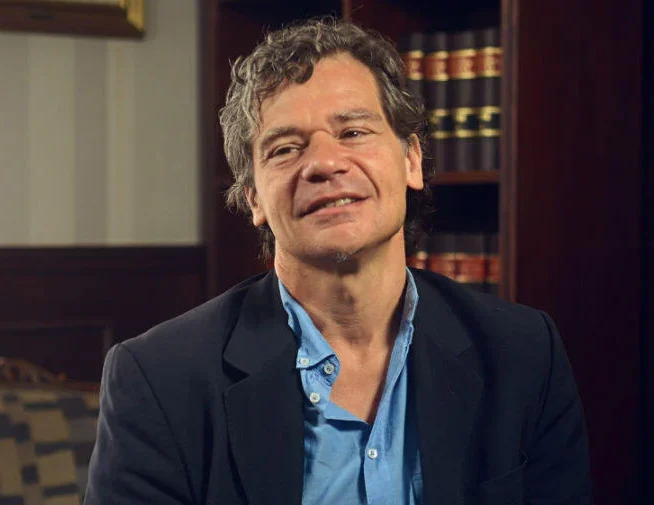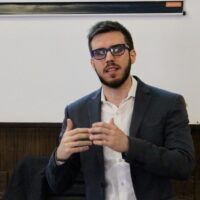As part of our “Portraits of FoE Defenders” interview series, Lautaro Furfaro, Senior Legal Researcher at CGFoE and Professor of International Human Rights Law at the University of Buenos Aires, speaks with Professor Roberto Gargarella about the alarming return of prior restraint in Argentina, the broader regional patterns of democratic regression, and the challenges facing the right to protest in contemporary Latin America.
Roberto Gargarella is a lawyer and sociologist from the University of Buenos Aires, and holds a PhD in Law from both the University of Buenos Aires and the University of Chicago, as well as postdoctoral studies at Balliol College, University of Oxford. He is a Professor of Constitutional Theory and Political Philosophy at Universidad Torcuato Di Tella and of Constitutional Law at the University of Buenos Aires. Gargarella has been a visiting professor and researcher at the Universities of Bergen and Oslo, Pompeu Fabra, New York, Columbia, The New School, and Harvard, and is the recipient of the John Simon Guggenheim (1999) and Harry Frank Guggenheim (2002) fellowships. His extensive work on constitutional theory and political philosophy includes Latin American Constitutionalism (Oxford University Press, 2013), The Legal Foundations of Inequality (Cambridge University Press, 2010), La justicia frente al gobierno, Las teorías de la justicia después de Rawls, and El derecho a protestar: El primer derecho.
In this conversation, Professor Gargarella reflects on recent judicial decisions that threaten freedom of expression in Argentina, most notably, the precautionary measure granted in favor of Karina Milei, Secretary General of the Presidency of the Nation, offering a powerful analysis of how courts across the Americas are responding to growing executive dominance and social discontent.

Photo: courtesy of Roberto Gargarella
Lautaro Furfaro: Professor Gargarella, the precautionary measure of prior restraint in favor of Karina Milei has been widely criticized in Argentina and globally. In your article “La mordaza de los quince días” (“The Fifteen-Day Gag Order”), you describe the decision as illustrating how an autocratic regime might operate. How would you compare the threats to rule of law in Argentina and the courts’ responses to what is happening in Brazil or the United States? Roberto Gargarella: The question is important, above all because it allows me to emphasize something that needs to be emphasized. American constitutionalism evolved in recognizable stages—its moment of “exploration”; its “foundational” moment; its social moment. Today we are facing a new moment or paradigm, which is one of democratic regression. This is something that is happening throughout the region, perhaps with different timings and expressions (and I include the United States here). We are facing political actions (typically from the Executive) and institutional responses (typically from the courts) that we did not expect. Political power takes advantage of its dominant position and the discrediting of the system to capture or gain control over the mechanisms that serve as checks on power; and the courts, (either for fear of being definitively colonized, or because they already are), tend to support rather than challenge the Executive’s initiatives.
Following your appeal, Karina Milei herself requested that the injunction be lifted. Do you interpret this withdrawal as an implicit acknowledgment of the measure’s legal flaws, or as a strategic move to prevent a stronger judicial statement on freedom of expression?
To tell the truth, I see the legal department within the government as an office where the distinctive traits of this administration are reproduced (perhaps to a greater extent than in other areas): improvisation, apathy, and clumsiness. Therefore, I find it difficult to see what happened as the product of a careful strategy: I would rather explain it as the result of the aforementioned unattractive traits.
In light of Argentine and Inter-American jurisprudence, could you briefly explain how courts should approach requests for precautionary measures that seek to prevent the dissemination of information allegedly obtained illegally but potentially involving matters of public interest?
The first thing to say is that we were faced with a case of “prior censorship,” a measure that is expressly prohibited both by Article 14 of the Argentine Constitution and by Article 13(2) of the American Convention on Human Rights (which has constitutional status according to Article 75(22) of the National Constitution). Article 14 enshrines the right of inhabitants to “express their ideas through the press without prior censorship,” while Article 13(2) of the ACHR provides that “[t]he exercise of the right provided for in the preceding paragraph [freedom of expression and thought] may not be subject to prior censorship but to subsequent responsibilities, which must be expressly established by law and necessary to ensure respect for the rights or reputation of others, or the protection of national security, public order, or public health or morals.” With regard to this last provision, the Inter-American Commission on Human Rights has been very clear about the absolute nature of this prohibition in the case of “Martorell v. Chile.” And the same principle was subsequently adopted by the Inter-American Court of Human Rights in the case of “The Last Temptation of Christ,” judgment of February 5, 2001.
Beyond what has been said, I would point out that the principles that should govern this matter are those of transparency in the actions of the public administration; the value of a “robust public debate”; and the special requirements and limitations, in terms of expression, of public administration officials: they are subject to criticism that can be unpleasant and extremely sharp, and at the same time constrained to make decisions subject to the broadest public scrutiny (as was well pointed out in the case of New York Times v. Sullivan).
Do you think this episode marks a turning point in the relationship between political power and the press in Argentina? More broadly, do you perceive a growing climate of institutional hostility toward critical journalism?
I wouldn’t say it’s a “turning point,” but I do consider what happened to be very important: we, like much of the legal community, did not let a measure pass that we considered to be in open violation of constitutional principles on free speech. Regarding the second part of the question, referring to the hostility that exists toward critical journalism, I would respond by saying that, unfortunately, everything seems too volatile in Argentina. Until a few weeks ago, I would have said yes, that there was a very strong protective cordon around the government, which sought to punish critical voices. Today (and I don’t know if I could say the same tomorrow), I would say that the political climate has changed, and that even the most pro-government journalists feel obliged to criticize the government.
You are one of Latin America’s leading scholars on the right to protest. How do you assess the current state of this right in Argentina, especially in light of recent statements by the Inter-American Commission on Human Rights and its Special Rapporteurship (RELE) (here, here, and here), which have expressed concern over restrictions and the use of excessive force? What institutional or interpretive reforms do you consider necessary to strengthen protest as a legitimate form of democratic expression?
For decades, street protests have been part of everyday life in Latin America, but this is not a sign of the strength of the system, but rather of its weakness and anomalies. Citizens are forced to mobilize in parks, avenues, and squares because they rightly recognize that the institutional channels reserved for expressing their demands and complaints are fundamentally blocked: the control systems do not work, and the doors to the system appear to be closed. That is why it is so important to protect the right to protest (instead of prosecuting its promoters or—much worse, as sometimes happens—treating them as seditious); but even more significant is to open genuine channels of expression and criticism for citizens. Unfortunately, however, the latter is not to be expected, given that those who should open these constitutional doors are the same ones who presently benefit from the closure of the democratic system. Today, as seems obvious, magistrates and politicians seem able to act independently of the collective will: the bridges between public officials and citizens appear to be fundamentally broken. We must therefore prepare ourselves to continue defending, doctrinally, the broadest right of citizens to criticize, mobilize, demand, and challenge power, through their writings, through the media, but also in the streets and parks.
Thank you very much for your time and for sharing your thoughts with us.

